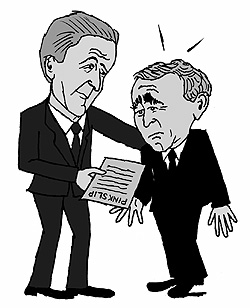I have a long history of supporting third-party and independent candidates for president. In 1996 and 2000, I voted for Ralph Nader. In my very first election, in 1980, I voted for Barry Commoner and the short-lived Citizens Party. And so it goes.
I’ve never been a fan of lesser-of-two-evils politics. I’ve always wanted to vote for someone I actually feel good about supporting, not simply someone who will do minimally less damage. Even if that candidate won’t win—or, in the case of 2000, helps the worst candidate win—I’ve wanted my vote to be an affirmation, contributing to an understanding that there is at least some degree of popular support for the progressive policies my candidates generally have advocated.
But not this year. This year I’m voting for John Kerry.
I’m doing so not because I’m especially enamored of Kerry. He has his good points, but in general he is exactly the sort of Democrat I’ve avoided supporting over the years: deeply committed to the status quo of American imperial power abroad and corporate dominance at home. Kerry does not challenge those assumptions; Ralph Nader does. So does the Green Party’s David Cobb. But I’m not voting for them.
It does not help that I’m not especially enamored this year of Nader or Cobb, either. They say all the right things, but Nader has maintained a near-pathological unwillingness to acknowledge that he draws votes from Democrats and thus helped cost Al Gore the election in 2000. His base has largely deserted him, and he seems to be running out of ego and a stubborn refusal to recognize that his time has come and gone.
As for his Green Party successor, Cobb knows that he doesn’t have Nader’s name recognition or his votes, so he has been running a “party-building” campaign that seems designed to claim success no matter how few votes he actually gets. Hey, if he doesn’t feel he needs my vote, he won’t get it.
But we need candidates like Nader and Cobb and the activists that sustain them. If Kerry is elected, the massive grassroots opposition that has developed in response to four years of the Bush administration had better stay in business. There can be no presumption, as there inexplicably was upon the 1992 election of Bill Clinton, that activists can relax, fold up shop, and go home.
Abroad, Kerry has mapped out a militarist approach, and he is at least as bad in regard to Israel and Palestine as Bush. Domestically, there will be some improvement, especially in regulatory and court appointments and in areas like health care—particularly if Democrats can also somehow improve their lot in Congress. But Kerry is as committed to globalization and its ills as Bush, and he is likely to do little to stem the steady loss of family-wage jobs streaming overseas.
But perhaps more than any other president in American history, George Bush deserves to be fired by the American people.
The list of reasons why is a near-exhaustive litany of his entire record, one of corrosive ideological rigidity combined with stunning incompetence: the Iraq invasion and the subsequent near-comic disaster of an incompetent occupation, loss of civil liberties, compulsive secrecy, a lousy economy and steady loss of decent jobs, repeated tax cuts for the wealthy, environmental degradation, corporate corruption, blurring the separation of church and state, the danger to reproductive freedoms— the list goes on and on and on.
If Bush is not re-elected, it will be repudiation, the opposite of a voter mandate. It will be a referendum on Bush’s record, particularly his decision to wage a reckless war for dishonest reasons. It will serve as a powerful disincentive for Kerry or any other future president to mount any sort of similarly reckless imperial campaign.
I don’t hate George Bush. I just want to fire him.
John Kerry deserves my vote because he can do something that Nader and Cobb cannot, something no other candidate can do: He can defeat Bush. If he does, Iraq will still be with us, but we’ll also have a clear message that presidents who try to wage aggressive wars in the future do so at the risk of their jobs.
That’s a message I can get behind.
John Kerry for president.







